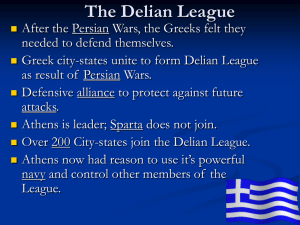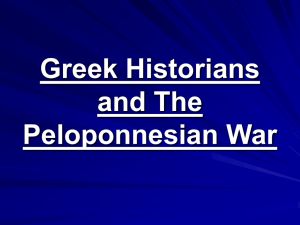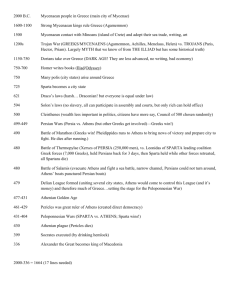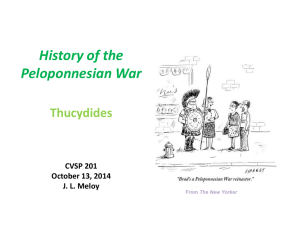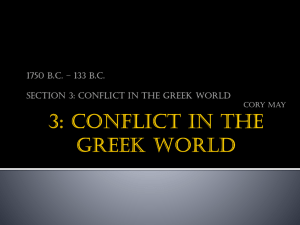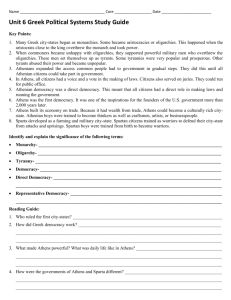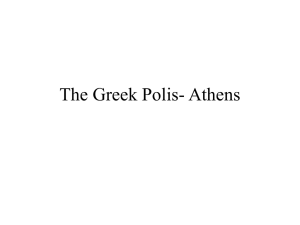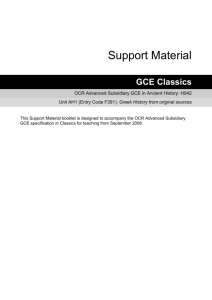Fight or Peace?
advertisement
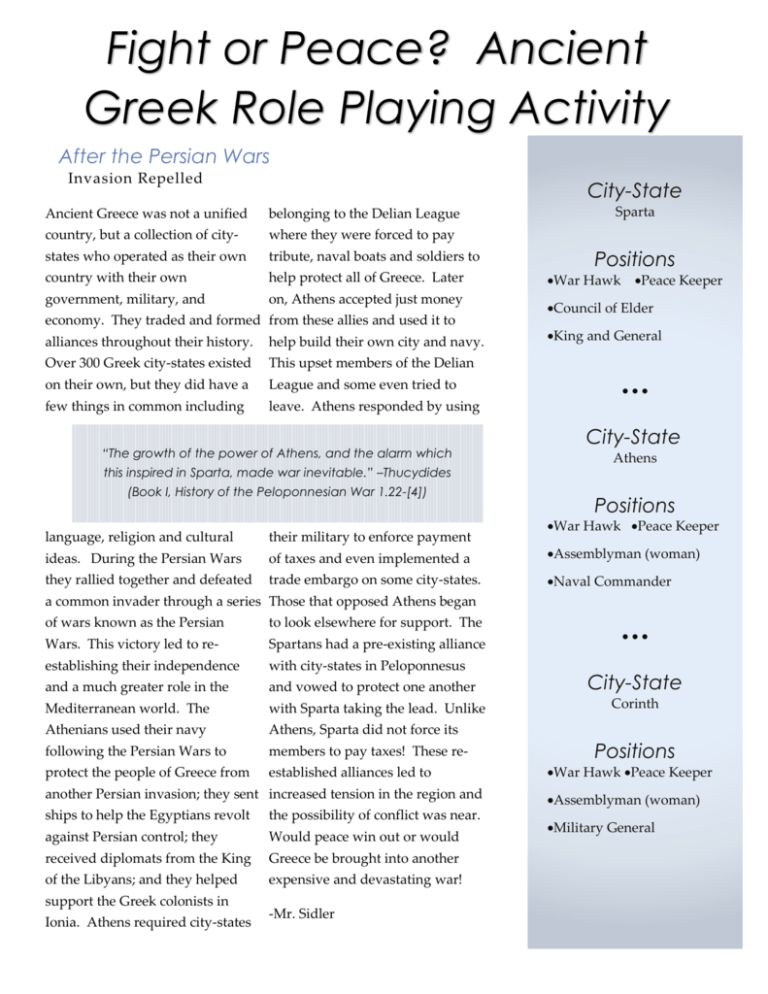
Fight or Peace? Ancient Greek Role Playing Activity After the Persian Wars Invasion Repelled City-State Sparta Ancient Greece was not a unified belonging to the Delian League country, but a collection of city- where they were forced to pay states who operated as their own tribute, naval boats and soldiers to country with their own help protect all of Greece. Later War Hawk government, military, and on, Athens accepted just money Council of Elder economy. They traded and formed from these allies and used it to alliances throughout their history. help build their own city and navy. Over 300 Greek city-states existed This upset members of the Delian on their own, but they did have a League and some even tried to few things in common including leave. Athens responded by using “The growth of the power of Athens, and the alarm which this inspired in Sparta, made war inevitable.” –Thucydides (Book I, History of the Peloponnesian War 1.22-[4]) Positions Peace Keeper King and General City-State Athens Positions War Hawk Peace Keeper language, religion and cultural their military to enforce payment ideas. During the Persian Wars of taxes and even implemented a Assemblyman (woman) they rallied together and defeated trade embargo on some city-states. Naval Commander a common invader through a series Those that opposed Athens began of wars known as the Persian to look elsewhere for support. The Wars. This victory led to re- Spartans had a pre-existing alliance establishing their independence with city-states in Peloponnesus and a much greater role in the and vowed to protect one another Mediterranean world. The with Sparta taking the lead. Unlike Athenians used their navy Athens, Sparta did not force its following the Persian Wars to members to pay taxes! These re- protect the people of Greece from established alliances led to another Persian invasion; they sent increased tension in the region and ships to help the Egyptians revolt the possibility of conflict was near. against Persian control; they Would peace win out or would received diplomats from the King Greece be brought into another of the Libyans; and they helped expensive and devastating war! support the Greek colonists in Ionia. Athens required city-states -Mr. Sidler City-State Corinth Positions War Hawk Peace Keeper Assemblyman (woman) Military General Role Playing Events Leading Up To the Peloponnesian War I am from the city-state of ___________________ and a ________________________(position) Cause # 1 of the Peloponnesian War Cause #2 of the Peloponnesian War Cause #3 of the Peloponnesian War Notes: -------------------------------------------------------------------------------------------------------------------------------------------Organize your notes in a 3 -2 -1 (3 facts, 2 ideas you found interesting, and 1 question) The Peloponnesian War The Peloponnesian War began in 431 BC between the Athenian Empire (or The Delian League) and the Peloponnesian League which included Sparta and Corinth. The war was documented by Thucydides, an Athenian general and historian, in his work History of the Peloponnesian War. The war lasted 27 years, with a 6-year truce in the middle, and ended with Athens' surrender in 404 BC. Causes of the war According to Thucydides, the cause of the war was the "fear of the growth of the power of Athens" throughout the middle of the 5th century BC. After a coalition of Greek states thwarted an attempted invasion of the Greek mainland by the Persian Empire, several of those states formed the Delian league in 478 BC in order to create and fund a standing navy which could be used against the Persians in areas under their control. Athens, the largest member of the league and the major Greek naval power, took the leadership of the league and appointed financial officers to oversee its treasury, which was located on the island of Delos, the League headquarters. Over the following decades Athens, through its great influence in the League, was able to convert it into an Athenian empire. Though some members of the League embraced Athenian conversion, just as many were bitterly opposed to the governments imposed upon them. Gradually League funds went more directly into Athenian projects, rather than into defending the Aegean and Greece from Persia. Pericles had the League treasury relocated from its home on Delos to Athens, from [where] most of the funds were used in vast building projects such as the Parthenon. As the member states of the League gradually lost their independence, it transformed into the Athenian Empire, whose growth Sparta watched with concern. The League, based around the Ionian and Aegean Sea, was by its very nature reliant on ships for trade and to fend off pirates and Persian fleets. As the League developed into the Athenian Empire, member states gradually lost control of their own ships, which they gave to Athens annually as tribute. Consequently, Athens began to accumulate a huge navy. This increase in Athenian military power allowed it to challenge the Lacedaemonians (commonly known as the Spartans), who, as leaders of the Peloponnesian League, had long been the sole major military power in Greece. The immediate cause of the war comprised several specific Athenian actions that affected Sparta's allies, notably Corinth. The Athenian navy intervened in a dispute between Corinth and Corcyra, preventing Corinth from invading Corcyra at the Battle of Sybota, and placed Potidaea, a Corinthian colony, under siege. The Athenian Empire also levied economic sanctions against Megara, an ally of Sparta. These sanctions, known as the Megarian decree, were largely ignored by Thucydides, but modern economic historians have noted that forbidding Megara to trade with the prosperous Athenian empire would have been disastrous for the Megarans. The decree was likely a greater catalyst for the war than Thucydides and other ancient authors admitted, more so than simple fear of Athenian power. Reference: G.L. Cawkwell, Thucydides and the Peloponnesian War (1997 London) Website: http://www.crystalinks.com/peloponnesianwar.html
